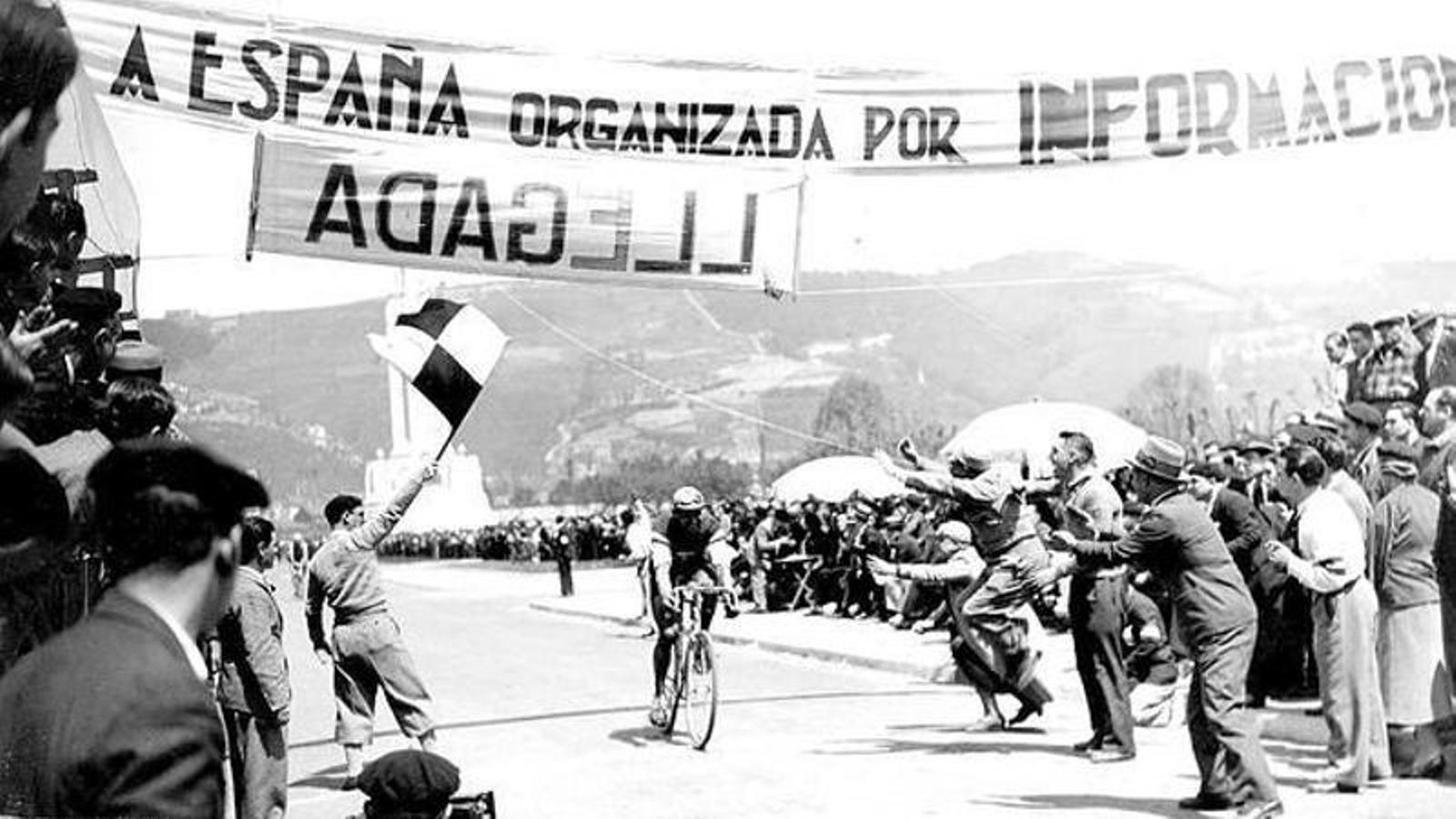The organizer of the Vuelta a España who was a friend of Franco and an admirer of Hitler
The race was organized in 1935 by 'Informaciones', a newspaper that received money from the Nazis.


BarcelonaOn April 29, 1935, a group of brave riders began pedaling through the center of Madrid, leaving from Atocha station. They were participants in the first edition of the Vuelta a España, a competition that this year celebrates its 80th edition in 90 years, as it was not always possible to take place. That first edition featured 50 cyclists who faced a 10-stage route of more than 250 km each. When the Vuelta returned to Madrid on May 15, only 29 cyclists arrived. The rest had folded, exhausted by a tough route on dirt roads, with slopes that broke their legs and caused damage to their iron bicycles. The winner was Belgian Gustaaf Deloor, who beat Catalan Mariano Cañardo, second in the general classification. Marianu He suffered a lot, as he quickly lost teammates and suffered falls.
Deloor took the crown, arriving in Madrid dressed in orange, the color of the leader's jersey. He chose that uniform because it was the color of the newspaper. Information, the race organizer. In the early 1930s, Spain still hadn't had a major race, when, for example, the Volta a Catalunya had already been around for 24 years, having been born in 1911. In the editorial office of 'Information The proposal arose to create a tour similar to the Tour, which had been created in 1903 by the sports newspaper The Self-veil, or the Giro Italiano, created in 1909 by La Gazzetta dello SportIn both cases, the color of the leader's jersey, yellow and pink, was the same as the newspaper pages.
Spain was inspired by the great races to find its own path. But unlike the French and Italians, the newspaper that was going to organize it wasn't a sports newspaper. Information It was a general-interest newspaper founded in 1922 in Madrid by veteran Aragonese journalist Leopoldo Romero, who would lose control of it with the rise of Primo de Rivera's dictatorship. At that time, it was already a best-selling newspaper in Madrid. A media outlet that would come to be controlled by the Mallorcan banker Joan March i Ordinas, who, taking advantage of an unreturned loan, took over the newspaper and gave it an increasingly conservative editorial line. The founder of Banca March would help finance the national coup d'état in 1936 and would pay out of his own pocket for the plane that took Franco to Morocco to launch the coup. But in the 1920s, he was still engaging in ideological spin and pursuing money wherever it could be, which implicated him in cases of corruption, deception, and bribery.
With the beginning of the Republic Information He was initially moderate. But it quickly became clear that he had decided to overthrow the Republic, and he radicalized to the right. In fact, he was given the leadership of Juan Pujol, a Murcian who admired Hitler. Some articles were written directly in the offices of the German government, which invested heavily in promoting itself abroad. In 1933, Information would publish a text signed by Hitler himself entitled "Because I am anti-Semitic. A newspaper that began receiving funding from the German government in 1934 would be the organizer of the Vuelta.
It was a Spain in which political tensions reigned. When the Vuelta was born, only two years had passed since the revolt and repression in Asturias. And the memory of the proclamation of the Catalan Republic, which had ended with Companys's imprisonment in 1934, was still very fresh. By organizing the Vuelta, Information took sides, since conservative sports fans did not look favorably on events such as the Gran Premio República, A single-day race first organized in 1932, which started from Eibar to Madrid. That is, it started from the first city where the Republic had been proclaimed, financed by a bicycle manufacturer from the Basque city. Cycling was also divided between supporters and critics of the Republic, and the drafting ofInformation He saw an opportunity. The idea came from Cantabrian journalist and former cyclist Clemente López-Dóriga, who proposed creating the race to Juan Pujol. The director welcomed the idea, and in 1935, one could read: "When organizing it, Information raise the flag of Spanishness and sporting fraternity" either "demonstrate civility, progress and pacification to foreigners, a task of patriotic exaltation of a nationality thirsty for new glories and bring together all the children of Mother Spain in a fraternal bond of mutual understanding in a moment of pain, dejection and confusion unanimous to achieve a national formation, so that attention.
The Vuelta a España was born as a "patriotic" competition in the hands of people who would support Franco. Pujol was a journalist from Murcia, the son of a Catalan merchant, who as a young man had been an anarchist, a movement he had discovered in Barcelona while studying law. It didn't last long. As a journalist, he began to lean towards the right, especially after working as a correspondent in the First World War, when he sided with the Germans. Pujol went to some of the toughest battles, from the Italian to the Russian front, and upon his return, he was seduced by the emerging fascism in Italy. His articles were already anti-Semitic. When Pujol was elected editor ofInformation, declared himself an admirer of Hitler. In fact, he was already a member of the JONS in 1933, and made trips to Italy to see Mussolini triumph. He was the ideal man to be elected head of propaganda and press for the Nationalists by the Burgos Defense Board in 1936, a position he would hold for six months. The rest of the war he would dedicate himself to writing articles praising Franco, writing things like "Our crusade is salvation. But this salvation has come too late for Catalonia. The Catalan people, with a few rare exceptions that deserve the title of heroic, have descended to an extreme of abjection incomparable to our proud national dignity. We want the land of Catalonia; more..."
During World War II he would also write, always in favor of Hitler. And unaware that in a prisoner of war camp he was surviving as best he could. Gustaaf Deloor, captured by the Nazis for defending Belgium. Deloor was sent to Stalag II-B in Pomerania, where hundreds of Belgians were mistreated by the Germans. Deloor was fortunate because a camp commander recognized him, as he was a great sports fan. He sent him to work in the kitchen, a privileged position because they ate better. He would spend almost two years there until the Nazis, seeking allies, promoted a policy favorable to Flemish nationalism in Belgium and allowed the Flemish prisoners to return home. Deloor, who hated the Nazis, eventually fled to the United States.
Pujol distanced himself from sports, unlike López-Dòriga. The Cantabrian was the son of a conservative family with plenty of money thanks to business deals made in Cuba. López-Dóriga was a good cyclist as a young man. Initially, he raced under a pseudonym, as a brother had died in a bicycle accident and his parents didn't want to hear about those two-wheeled contraptions. After retiring, he helped young riders, patronizing them. This led him to experience many international races, which led him to propose the Vuelta a Pujol using the journalist's contact.Information Manuel González Domingo, with whom he was friends. The Cantabrian wasn't particularly interested in politics. In fact, it seems that he had even offered the idea of the Vuelta to a Republican newspaper before 1935. When the proposal was rejected, he knocked on the door ofInformation. And so he would be chosen as the director of the test. And he would dedicate his life to cycling. After the Civil War, he collaborated with Information while continuing his work within the Vuelta. From 1945 onwards the race would be organised by other newspapers, such as the Already, owned by the Church. In 1955, the race would be organized by the newspaper The Spanish Post Office/The Basque People, thanks to an initiative by businessman and former footballer Luis Bergareche, who would lead the last stage in Bilbao until 1978. From 1979, it was organized by a company, Unipublic.
